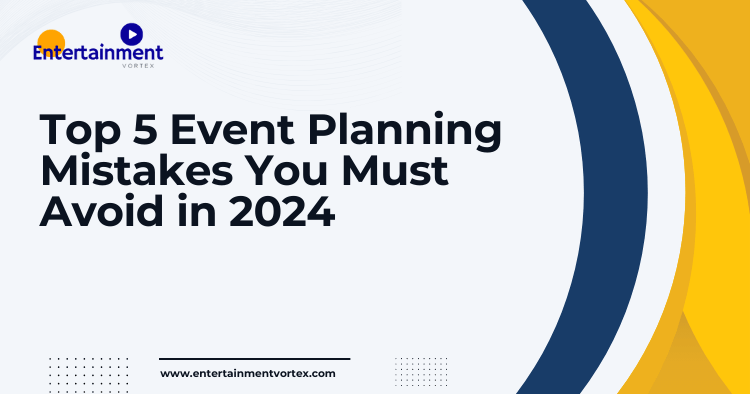Table of Contents
- Not Defining Clear Objectives
- Ignoring Your Target Audience
- Underestimating the Budget
- Neglecting Marketing and Promotion
- Failing to Have a Contingency Plan
Planning an event can be an exhilarating experience filled with creativity and excitement. However, it can also be a minefield of potential pitfalls. As we step into 2024, it’s crucial to avoid common mistakes that could derail your event from being a success. Let’s dive into the top five event planning mistakes you absolutely must avoid this year!
1. Not Defining Clear Objectives
One of the biggest mistakes event planners make is failing to set clear objectives. Before diving into the logistics, ask yourself: What do you want to achieve with this event? Whether it’s raising funds, building community, or launching a product, having a well-defined purpose will guide every decision you make.
Why It Matters:
- Objectives provide direction and help in measuring success.
- They assist in aligning your team and resources toward a common goal.
Tips for Setting Objectives:
- Use the SMART criteria: Specific, Measurable, Achievable, Relevant, Time-bound.
- Write down your goals and share them with your team to ensure everyone is on the same page.
FAQs:
- What if my objectives change as the event planning progresses?
This is normal! Just ensure to communicate any changes to your team and adjust your plans accordingly.
2. Ignoring Your Target Audience
Your event might be flawless in execution, but if it doesn’t resonate with your target audience, it will likely fall flat. Understanding who your audience is can help tailor the event experience, from the theme to the activities and even the venue.
Why It Matters:
- Engaging the right audience can lead to better participation and a more memorable experience.
- It helps in creating targeted marketing strategies to attract attendees.
Tips for Identifying Your Audience:
- Conduct surveys or use social media polls to gather insights.
- Create personas based on demographics, interests, and preferences.
FAQs:
- Can I have multiple target audiences?
- Yes! Just ensure that your event has elements that appeal to each group without diluting the experience.
3. Underestimating the Budget
Budgeting is a fundamental aspect of event planning that’s often neglected. Underestimating costs can lead to financial stress and impact the overall quality of your event.
Why It Matters:
- A well-planned budget allows for better resource allocation and less stress closer to the event date.
- It helps to avoid hidden costs that can arise unexpectedly.
Tips for Budgeting:
- Break down your budget into categories: venue, catering, marketing, entertainment, etc.
- Set aside a contingency fund of at least 10-15% of your total budget for emergencies.
Example Budget Table:
| Category | Estimated Cost |
|---|---|
| Venue | $3,000 |
| Catering | $2,500 |
| Marketing | $1,000 |
| Entertainment | $1,500 |
| Miscellaneous | $500 |
| Total | $8,500 |
FAQs:
- What if I go over budget?
- Review your expenses regularly and make adjustments where necessary. It’s also helpful to have a backup plan for cost-saving measures.
4. Neglecting Marketing and Promotion
Even the most spectacular event will struggle to attract attendees without effective marketing. Neglecting this crucial component can result in empty seats and missed opportunities.
Why It Matters:
- Marketing creates buzz and excitement around your event.
- It ensures that your target audience is aware and motivated to attend.
Tips for Effective Promotion:
- Utilize social media platforms and email marketing to reach your audience.
- Create an event website with all necessary details, including registration options.
Outbound Links:
- Consider checking out Eventbrite’s Guide to Event Marketing for more strategies.
FAQs:
- How far in advance should I start promoting my event?
- At least 6-8 weeks prior for local events, and 3-6 months for larger, more complex gatherings.
5. Failing to Have a Contingency Plan
In the world of event planning, things can go wrong at any moment. Failing to have a backup plan can turn minor hiccups into major disasters.
Why It Matters:
- A contingency plan provides a roadmap for handling unexpected situations, ensuring the event can proceed smoothly.
- It minimizes stress and uncertainty for both planners and attendees.
Tips for Crafting a Contingency Plan:
- Identify potential risks (bad weather, vendor cancellations) and develop strategies to mitigate them.
- Assign roles to your team for handling different types of emergencies.
FAQs:
- What should be included in a contingency plan?
- Communication protocols, alternative venues, backup vendors, and emergency contact information.
By steering clear of these top five event planning mistakes, you can set yourself up for success in 2024. Remember, preparation and adaptability are key to creating unforgettable experiences for your attendees. Happy planning!
Also look for more ideas on engaging your attendees and enhancing their experiences at events. Consider exploring 10 Fun Hobbies to Enjoy Together with Your Kids for activities that can be integrated into family-oriented events or consult 10 Essential Tips for Craft Fairs: Prep & Expectations Guide for insights into organizing a successful craft fair.






